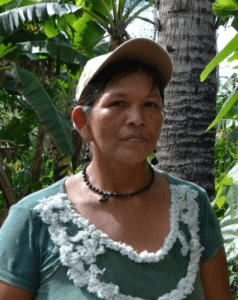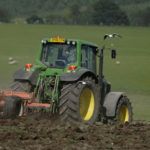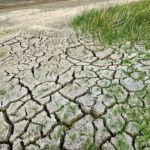 Roxana Anez is an indigenous leader from the community of Altamarani in the Bolivian Amazon. She is the President of the Community Women’s Organisation and worked closely with Christian Aid’s partners in the region to identify ways to mitigate the impacts of climate change. Here Roxana highlights some of the intersections between gender, climate and health, and talks about the impacts of changing weather patterns on their livelihoods.
Roxana Anez is an indigenous leader from the community of Altamarani in the Bolivian Amazon. She is the President of the Community Women’s Organisation and worked closely with Christian Aid’s partners in the region to identify ways to mitigate the impacts of climate change. Here Roxana highlights some of the intersections between gender, climate and health, and talks about the impacts of changing weather patterns on their livelihoods.
My name is Roxana Añez, I am 40 years old. I live with my husband Nolberto in the indigenous community of Altamarani, on the shores of the river Beni in the Bolivian Amazon together with 16 other families. The forest and rivers provide for us and the nine children that we have raised here.
When I was a little girl I barely learnt to read or write. Sending girls to school was not considered to be important at all in my community. I was clever and brave, I had lots of ideas in my head but when I wanted to express them and participate in decision making processes in my community nobody ever listened to me, or to any of the women for that matter. We were invisible! I felt so frustrated. That’s why I decided to become a representative in the women’s organisation in my indigenous territory. Things did not change quickly, there is still a long way to go, we really have to fight for our voices to be heard. But I have had the opportunity to attend leadership courses and I am gaining experience and my voice is getting stronger every day.
As our voices have gotten stronger we have been able to express our needs and contribute new ideas and perspectives to improve the lives of our families, and to protect the forests which are an extended part of our home.
We identified the serious problem of our dependency on firewood for cooking, which led not only to deforestation but also to health problems caused by hours spent cooking over a smoky fire pit, not to mention the difficulties and long hours spent by women in searching for dry fuel especially during recent years when we have experienced prolonged rainy seasons.
We are now using solar ovens. This has meant a big change in our everyday lives, the way we cook food, but I have encouraged and led my friends to embrace the change because I can see the positive effects on the environment, on their families’ health, on our environment and I also see how much time the solar ovens save. They enable women, especially, to get involved in other activities outside their homes, such as the leadership courses.
Voices from around the world, such as Roxana’s, are important in bringing the issue of climate justice to attention of decision makers in Scotland. These stories highlight how climate change is already impacting on livelihoods. They highlight the need for countries like Scotland to show real leadership and to step up to the ambition required to meet the Paris Climate Agreement
You can find other global stories like Roxana’s in our 100 voices project. One hundred individuals, including many directly impacted by climate change and those working to help tackle climate change, have urged Scotland to ‘Give it 100%’ in our efforts to cut emissions. Contributions include impassioned pleas from farmers in Africa, vulnerable communities in Asia, indigenous Arctic groups and Pacific Islanders.



